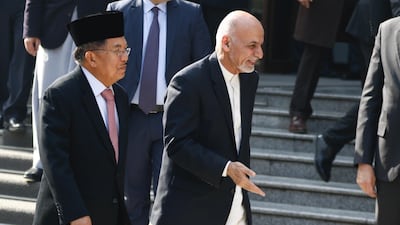Afghanistan's President Ashraf Ghani presented a detailed peace offer to the Taliban leadership on Wednesday, outlining a deal for negotiations that could meet the group's demands for political recognition and release of prisoners.
The first day of the Kabul Process, a conference to push forward Afghan-led peace talks, started with Mr Ghani's appeal for a ceasefire, following the Taliban's bloody insurgency since it was toppled from government in late 2001.
The Afghan president also acknowledged the need for engagement with Pakistan. The two countries have seen relations plummet in the past two years, with border skirmishes and accusations from Kabul that Pakistan continues to provide shelter to attackers who have besieged Afghan cities. The violence has added to millions of Afghan refugees living in Pakistan.
The two day conference includes delegates from 25 countries and several international organisations.
"We will be ready to start talks with Pakistan and forget the past and start a new chapter," President Ghani said in his opening statement.
Among the courtesies extended, Afghanistan's government would be willing to provide passports to Taliban members and visas to their families, allow the group to open a political office in Kabul, and will work to remove sanctions against the group's leaders.
The key document, titled Offering Peace: Framing the Kabul Conference, stressed an urgent need for a political process, without violence and conflict.
__________
Read more:
Afghanistan: Taliban and ISIL claim attacks that killed 23
Afghanistan's identity crisis erupts on social media
__________
"The ball is in the Taliban's court now," Aziz Amin Ahmadzai, a security analyst who has worked closely with Mr Ghani's office in the past, told The National.
"The president has put forward a very comprehensive and inclusive peace plan, which was formed after meetings with political elites of across the country to form a consensus in their approach.
"Now the Taliban should approach the Afghan people because eventually it will have to be an intra-Afghan dialogue that can address their grievances."
A resurgent Taliban has been blamed for much of the increased violence in Afghanistan since US and NATO forces concluded combat missions in 2014. The recent attacks have underscored the weaknesses of Afghan security forces more than 16 years after the US-led invasion toppled the Taliban.
US deputy assistant secretary for South and Central Asia Alice Wells has said the United States has kept the door open to dialogue with the Taliban.
The Taliban in a statement Monday called on US officials to talk directly to their political office regarding a peaceful solution to the fighting.
President Ghani's offer, made "without any conditions", however, raised flags among some groups in Afghanistan, particularly after the recent spate of attacks.
"I am cautious about this new deal," said Dr Simi Yousefi, remarking on destruction of civilian lives and property she has seen growing up under the Taliban. "We have seen and experienced their extremism first hand. I am not confident the Taliban will change their minds and policies so easily."
On January 27, a Taliban attacker drove an ambulance filled with explosives into the heart of the city, killing at least 103 people and wounding as many as 235.
And a week earlier the militants stormed a luxury hotel in Kabul, killing 22 people, including 14 foreigners, and setting off a 13-hour battle with security forces.
Among the peace document's contents is an assurance that the rights of women would be safeguarded, with a government delegation, appointed by the High Peace Council, including women and civil society members. "Women, who fear loss of their rights and gains, must be particularly engaged and kept informed," it reads.
The role to be played by the United States remains an issue, however. American forces continue to target Taliban training camps and other fighting positions in Badakhshan province. Such attacks have intensified in recent months against Taliban, Islamic State and other terrorist groups.
"One week they bomb them, the next week they want to make peace. I don't understand these quickly changing policies of the government and the Americans," Dr Yousefi added.

